Related Research Articles
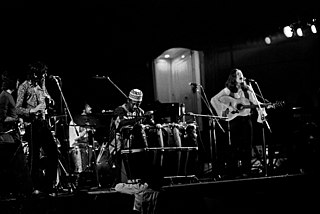
Traffic were an English rock band formed in Birmingham in April 1967 by Steve Winwood, Jim Capaldi, Chris Wood and Dave Mason. They began as a psychedelic rock group and diversified their sound through the use of instruments such as keyboards, sitar, and various reed instruments, and by incorporating jazz and improvisational techniques in their music.

Can were a German experimental rock band formed in Cologne in 1968 by Holger Czukay, Irmin Schmidt (keyboards), Michael Karoli (guitar), and Jaki Liebezeit (drums). The group featured several vocalists, most prominently the American Malcolm Mooney (1968–70) and the Japanese Damo Suzuki (1970–73). They have been widely hailed as pioneers of the German krautrock scene.
"The Low Spark of High Heeled Boys" is the title track from the 1971 album by British rock band Traffic, written by Jim Capaldi and Steve Winwood. Despite never being released as a single due to its long duration, it became a staple of North American AOR-format FM radio stations in the 1970s and still receives airplay on classic rock radio today.
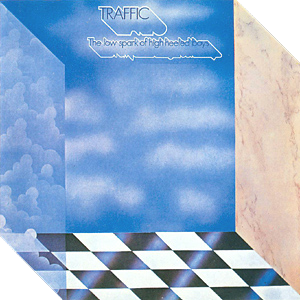
The Low Spark of High Heeled Boys is the fifth studio album by English rock band Traffic, released in 1971. The album was Traffic's most successful in the United States, reaching number 7 on the Billboard Top LPs chart and becoming their only platinum-certified album there, indicating sales in excess of one million. However, it failed to chart in the United Kingdom. The album features the minor hit "Rock & Roll Stew" and the title track, which received heavy FM airplay.

Christopher Gordon Blandford Wood was a British rock musician, best known as a founding member of the rock band Traffic, along with Steve Winwood, Jim Capaldi and Dave Mason.

Shoot Out at the Fantasy Factory is the sixth studio album by English rock band Traffic released in 1973. It followed their 1971 album The Low Spark of High Heeled Boys and contained five songs. Shoot Out, while achieving poorer reviews than its predecessor, did reach number six on the Billboard Pop Albums chart, one space higher than Low Spark had peaked in 1972. Like its predecessor, the original jacket for the Shoot Out LP had its top right and bottom left corners clipped. The album was remastered for CD in 2003.

When the Eagle Flies is the seventh studio album released by English rock band Traffic, in 1974. The album featured Jim Capaldi, Steve Winwood and Chris Wood, with Rosko Gee on bass guitar. Percussionist Rebop Kwaku Baah was fired prior to the album's completion, but two tracks feature his playing. Winwood plays a broader variety of keyboard instruments than most previous Traffic albums, adding Moog to their repertoire. This was the last Traffic album for 20 years, when Winwood and Capaldi reunited for Far from Home in 1994.

Anthony "Rebop" Kwaku Baah was a Ghanaian percussionist who worked with the 1970s rock groups Traffic and Can.
Bryson Macrae Graham was an English rock drummer, most notable as a member of Mainhorse, Spooky Tooth and Girl, and as a session musician.
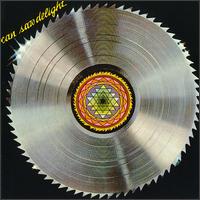
Saw Delight is the eighth studio album by the German rock band Can, and features two new band members who were ex-members of the band Traffic, Rosko Gee and Rebop Kwaku Baah, with Can's bassist Holger Czukay giving up the bass in favour of experimental effects.

Out of Reach is the ninth studio album by the German krautrock band Can, released as an LP in 1978 on Harvest Records. It is their tenth official studio album, discounting compilations such as Unlimited Edition.

Welcome to the Canteen is the first live album by English rock band Traffic. It was recorded live at Fairfield Halls, Croydon and the Oz Benefit Concert, London, July 1971 and released in September of that year. It was recorded during Dave Mason's third stint with the band, which lasted only six performances.
On The Road is the second live album by English rock band Traffic, released in 1973. Recorded live in Germany, it features the Shoot Out at the Fantasy Factory band, with the Muscle Shoals Rhythm Section of keyboardist Barry Beckett, bassist David Hood, and drummer Roger Hawkins.
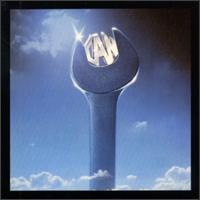
Can, also known as Inner Space, is the tenth studio album by experimental rock band Can, released in 1979. Former bassist Holger Czukay's involvement with this album was limited to tape editing. It was Can's last album before the reunion album Rite Time, ten years later, and was released after the band's break-up.

Paul Delph was a Los Angeles-based singer, songwriter, producer, engineer, and studio musician whose catalog includes work with many well-known recording artists from the late 1970s through the mid-1990s. Delph died from complications of HIV/AIDS at his parents' home in Cincinnati, Ohio. His ashes are interred at Spring Grove Cemetery in Cincinnati. A panel in Delph's name is part of the NAMES Project AIDS Memorial Quilt.
"Dancing with Mr. D." is the opening track of the English rock and roll band the Rolling Stones' 1973 album Goats Head Soup.

Joe Cocker is the third studio album by Joe Cocker, released in 1972 in Europe as Something to Say on Cube Records, and in the USA as Joe Cocker on A&M Records. It contains the hit single "High Time We Went", that was released in the summer of 1971. Joe Cocker signalled Cocker's change of direction into a more jazzy, blues style. The album reached no. 30 in the US album charts. However, although it received a positive response from the press, it made no impression on the British and European charts.

Anthology, also called Anthology - 25 Years and Anthology 1968-1993, is a compilation double album by Krautrock artists Can which was released in 1994. Several of the songs are presented in edited form. The first CD has the same track listing as Can's previous compilation, Cannibalism.
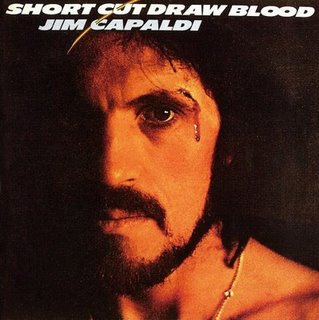
Short Cut Draw Blood is the third studio album by the British musician Jim Capaldi, released by Island Records in 1975. It marked a major turning point in Capaldi's career: it was his first album recorded after the breakup of Traffic, and more importantly it was his commercial breakthrough. While Capaldi's first two solo albums had been moderately successful in the United States, Short Cut Draw Blood entered the charts in several other countries for the first time. This was particularly evident in his native United Kingdom; the single "It's All Up to You" at number 27, released a year before the album, became his first top 40 hit there, only to be overshadowed the following year by his cover of "Love Hurts", which went all the way to number 4.
Zahara were a jazz fusion ensemble who released one album for Antilles Records.
References
- ↑ Spelling variations include "Rosco" and "Roscoe"
- ↑ "Zahara (3) - Flight Of The Spirit (Vinyl, LP, Album) at Discogs". Discogs.com. 1983. Retrieved 24 August 2014.
- ↑ "Rosko Gee". IMDb.com. Retrieved 24 August 2014.
- ↑ "Rosko Gee & The Hooded Ones" (PDF) (in German). Perfect Zero Music. Retrieved 24 November 2017.